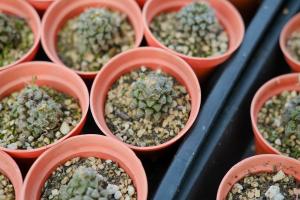Introduction
Plants are crucial to sustaining life on earth, as they are the primary source of food production for both humans and animals. However, not many of us think about the basic physiological processes that plants go through each day, such as how they lose water in the dark. In this article, we will explore the reasons why plants lose water in the dark and the significance of this process.
Water loss in plants
Plants lose water through a process called transpiration, which is the movement of water from the roots to the leaves, where it is lost to the atmosphere as water vapor. This process is necessary for the plant's survival because water is essential for photosynthesis, which is the process by which plants create glucose (sugar) using sunlight, water, and carbon dioxide. However, plants can also lose water through other means, such as guttation, which is the excretion of water droplets through special structures called hydathodes.
The role of light in transpiration
Light plays a crucial role in transpiration because it stimulates the opening of stomata, which are tiny pores on the surface of leaves that allow gases (oxygen and carbon dioxide) to enter and exit the plant. When stomata are open, water vapor can escape from the plant through these pores, thus leading to transpiration. Therefore, plants tend to lose more water during the daytime when there is more sunlight compared to the nighttime.
Why do plants lose water in the dark?
Now, the question remains, why do plants lose water in the dark when there is no light to stimulate stomatal opening? The answer lies in the process called respiration, which is the opposite of photosynthesis. In respiration, glucose is broken down to release energy that the plant needs to carry out its metabolic processes. Just like in animals, respiration occurs in plant cells and requires oxygen and glucose to produce carbon dioxide and water. Therefore, even in the absence of light, plants continue to undergo respiration, which leads to the loss of water through the stomata.
The significance of water loss in the dark
The significance of water loss in the dark lies in its relationship with plant growth and survival. Water loss through transpiration is necessary for nutrient uptake and transport, as it creates a negative pressure that draws water and nutrients from the soil into the plant. Therefore, if a plant is not losing water, it may not be able to absorb enough nutrients to grow and survive properly. On the other hand, excessive water loss can lead to wilting, dehydration, and even death, especially in arid or drought-prone areas where water is scarce.
Conclusion
In conclusion, plants lose water in the dark through a process called respiration, which occurs even in the absence of light. While this process is necessary for plant growth and nutrient uptake, it can also lead to excessive water loss and dehydration if not regulated properly. Therefore, understanding the basic physiological processes of plants can help us appreciate their role in sustaining life on earth and motivate us to conserve and protect these precious resources.

 how many times do yo...
how many times do yo... how many planted tre...
how many planted tre... how many pine trees ...
how many pine trees ... how many pecan trees...
how many pecan trees... how many plants comp...
how many plants comp... how many plants can ...
how many plants can ... how many plants and ...
how many plants and ... how many pepper plan...
how many pepper plan...






























